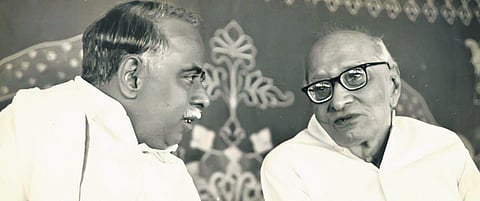

CHENNAI: The years after Independence were heady for the Congress, but not heady enough that the first elections in the Madras Presidency in 1952 were a cakewalk. In fact, the party did not even win a simple majority, having to resort to wheeler-dealing, reportedly along with some Central government support to form its government that year.
The Madras Presidency, with 375 Assembly constituencies, covered Tamil Nadu and parts of Kerala, Karnataka and undivided Andhra. The Congress entered the election seeking votes on the basis of its role in the freedom struggle. The results, then, proved a shock to the party. Although it emerged the single largest political party in Assembly, winning 152 of 375 seats, it did not secure a simple majority that would allow it to form a government.
The Communist Party of India emerged as the second-largest party with 62 seats (13.18% votes) while the Kisan Mazdoor Praja Party came third with 35 seats (9% votes), followed by the Tamil Nadu Toilers Party with 19 seats (4.25%) and the Commonweal Party with six seats (1.09%). Independents and other smaller parties won in a whopping 68 seats.
The Communists, seeing an opportunity to thwart the Congress, stitched together a post-poll alliance with the help of T Prakasam of the Kisan Mazdoor Praja Party. This alliance, dubbed the United Democratic Front, boasted the support of 166 MLAs. However, the State’s Governor Sri Prakasa refused to let the Opposition parties form the government. At the time, it was alleged that the Congress-led Union government had pressured the Governor to thwart the Communist party-led efforts.
This was arguably the first instance of the Union government exerting its influence on a State through a Governor. Amid the political crisis, the Congress approached party stalwart, C Rajagopalachari, the former Governor-General of India, and asked him to head the Cabinet and form a government. The party cobbled together support from a few smaller parties like the Commonweal Party and got some independent winners to merge with it in order to secure a strength of 167 in the Assembly. Rajagopalachari became the first Chief Minister of the State.
‘Kula Kalvi Thittam’
Roped in to steady the boat, Rajagopalachari managed to create a new political crisis within a year of his Chief Ministership. He introduced a new education scheme in the State called the ‘Modified Scheme of Elementary Education’. As per this scheme, schools would function in two shifts, but students would only attend one session of three hours (instead of the earlier five hours) and would learn the trade of their parents in the remaining time.
The proposal created an uproar with Opposition parties, including the then recently launched DMK, and even a section of Congress members expressing their displeasure. Dravidar Kazhagam president Periyar EV Ramasamy termed the scheme as ‘Kula Kalvi Thittam’, suggesting that children were being encouraged to take up their traditional caste-based trade rather than pursue education. Significantly, this was the first time since the DMK parted ways with the DK that the two were on the same page. The DMK organised protests against the proposal throughout the State, even besieging the CM’s residence.
Following this, a section of legislators moved a motion for an amendment to the effect that the scheme be stayed and referred to an expert committee of officials and non-officials in the educational field. The motion was adopted in the House and carried forward. Aware that even Congressmen were opposed to the scheme, and needing to prevent the DMK from using the opportunity to grow its base, the Congress leadership asked Rajagopalalachariar to resign. He accepted and resigned in April 1954. K Kamaraj was subsquently elected CM, assuming office on April 13,1954. Kamaraj whittled the 15-member State Cabinet to just seven members and headed it till the end of the first Assembly’s term.